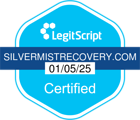Is My Drinking Habit Turning Into An Addiction?

Alcohol consumption is a routinely common part of life in America. Most events, concerts and parties include the serving of alcohol to some extent. And while there is nothing wrong with an occasional drink, problems start to arise when consumption becomes frequent, uncontrolled and even binged.
Sometimes, we have enough self-awareness to recognize when our habits become unhealthy or when our choices aren’t the ones we want to make. Other times, it takes loved ones in our lives to notice and bring these unhealthy habits to our attention.
In order to know when alcohol consumption is a problem and when it is time to seek help, it is beneficial to know the signs of alcohol addiction – the more you understand, the better equipped you will be to begin reversing these behaviors.
Understanding alcohol addiction
Formally known as the medical condition of alcohol use disorder (AUD), this is what occurs “when a person can no longer control their alcohol use despite the negative social, occupational, or physical or mental health consequences it causes.” And it is much more common than you may think.
According to the 2021 National Survey on Drug Use and Health, “174.3 million people (or 62.3 percent) aged 12 or older reported alcohol use during a 12-month period.” Additionally, “In 2021, 29.5 million Americans aged 12 or older met the diagnostic criteria for an AUD. Only 1.4 million of them, however, received alcohol use treatment of any kind.”
There may be many reasons people do not seek treatment for alcohol use disorder, including fear of judgment, financial hardship and the cost of treatment, and struggling to find the time to be present at rehab meetings; but with the right treatment facility, you will find that the programs are designed to be personalized, thereby addressing these concerns appropriately.
By raising awareness of the benefits of alcohol addiction rehab, we can hopefully get more Americans the help they need, so they may experience the freedom they deserve.
Alcohol addiction criteria
While we can all self-diagnose to the extent that we may recognize certain unwanted signs and symptoms of alcohol misuse, a true diagnosis of an AUD needs to meet certain criteria as found in the Diagnostic and Statistical Manual of Mental Disorders, Fifth Edition (DSM-5). It is these parameters that help differentiate a true addiction from disordered habits.
That being said – you or your loved one do not need to reach the point of meeting every DSM-5 criteria to get treatment. As with many things, intervention early on is key to prevention, so if you notice some of these criteria appearing in your life, it may be worthwhile to seek counseling for unhealthy coping mechanisms.
Some of the criteria the DSM-5 identifies as warnings for alcohol use disorder include:
- Experiencing tolerance is a state when the body does not feel the same effects from the same amount of alcohol as it used to, meaning more alcohol is often consumed in order to achieve those desired effects;
- Consuming alcohol more frequently or in greater amounts than ever intended;
- Trying and failing to stop using on your own or attempting to get control over dysregulated habits without success;
- Finding yourself preoccupied with thoughts of when you will next be able to drink, how you will get your next drink and then spending much time recovering from drinking;
- Withdrawing from social, recreational or occupational activities/obligations as a result of drinking habits;
- Experiencing a breakdown in relationships, friendships and work/school performance as a result of uncontrolled alcohol consumption;
- Continuing to use alcohol despite these breakdowns;
- Experiencing financial struggles as a result of alcohol use, but continuing to use regardless;
- Using alcohol in situations where it puts your safety and the safety of those around you at risk;
- Suffering from severe withdrawal symptoms when alcohol consumption is stopped – withdrawal symptoms may include anything from less severe flu-like symptoms and intense cravings to more severe signs like hallucinations and seizures;
- Experiencing cravings for a drink when an extended period of time goes by without one;
- Continuing to consume alcohol even though psychological, mental or behavioral problems have been worsened or caused by repeated consumption.
If you have recognized some or many of these criteria in your life, it may be time to consider the benefits of alcohol addiction treatment to help you form healthy habits and reorient your life towards freedom and wellness.
Looking for rehab for alcohol addiction?
Whether you want a treatment facility where you can enroll and stay during the duration of your detox and treatment, or need the flexibility to come and go in order to maintain other obligations, Silvermist Recovery is here for you. With personalized treatment plans, you will be able to design a plan that is perfectly suited to meet your needs and treatment goals.
To begin your journey to recovery today, contact Silvermist Recovery by calling (412) 561-9558 to learn more.







